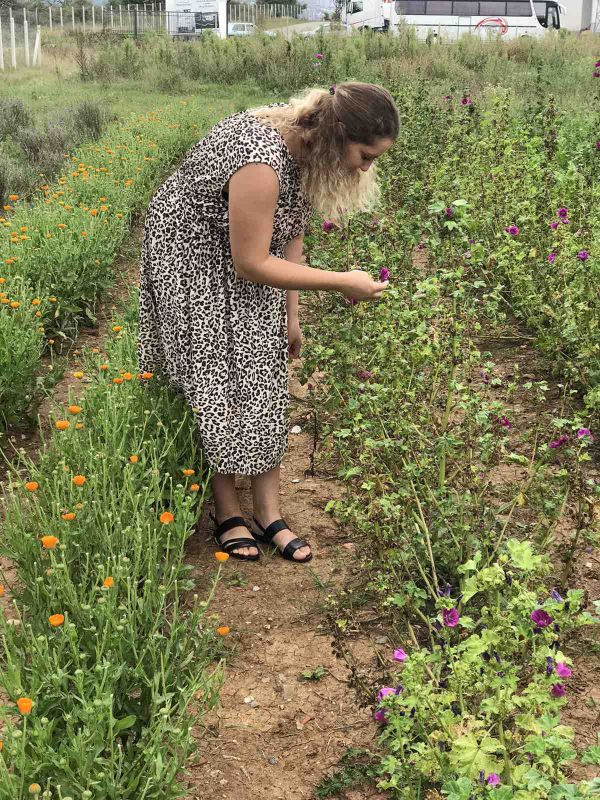At the start of 2020, Arbesa Lushtaku Veliu, a newly graduated agronomist, got a job with Agroflorentina, a company for the collection, cultivation, and processing of wild mushrooms, wild forest fruits, and aromatic plants.
Just a few months into her first job, everything changed due to the COVID-19 pandemic. Restricted movement and increased health safety measures disrupted everyone’s life. For rural women, this meant fewer opportunities for gainful work, and even less access than before to training, networking, and having more perspectives.
Along with 26 other women working in cultivation of medicinal aromatic plants (MAPs) across Kosovo, at the beginning of the summer season, Arbesa enrolled in a 4-week long training program on how to manage cultivation of MAPs and the farm. The training is regularly delivered by the Kosovo Association of Processors and Exporters of Non-Wood Forest products ORGANIKA. This year though, there was a catch to it: COVID-19.
The obvious choice was to deliver the training online. However, use of more advanced online training platforms required a certain degree of familiarity and skills with such tools. “Women living in the rural areas cannot always make time at the appointed schedule to attend online lectures, due to their workload and various obligations around the farm and household,” says Faton Nagavci, Executive Director of ORGANIKA.
The solution was as resourceful as it was simple: the training would be delivered via Viber, an instant messaging software that is very popular in Kosovo, especially among rural women.
ORGANIKA set up five Viber groups, one for each participating company. The training material produced was Viber-friendly, in the format of short explanatory videos, posters, and text advice. The groups also enabled discussion among participants, seeking further clarification or additional information on the video material.
Says Arbesa, “The training was very useful, especially for the women involved in cultivation. Since I am still new in farm management, I learned a lot about cultivation and keeping notes. The method of delivery was also spot on, perhaps more understandable than just listening to lectures. And the platform chosen – Viber – was the right one, as it was much easier for the women to use. They are very happy with the program.”
Hanumshahe Veseli is one of Agroflorentina’s farmers, who works with Arbesa. Her family started to cultivate MAPs in their land two years ago. “The training was very useful; I did not miss any part because we received all the videos and I had more time to focus. So, it was easier for me to remember all the information and tips. Even my husband studied the material.”
All 27 training participants share the same key things they appreciate about the program: they could watch the videos whenever they had free time, so no need to stop working; the videos were more attractive that online lecturing; and they saved the videos to consult anytime to refresh information.
“The training took place at the right time, when we were about to begin cultivation and management of organic plots” says Havushe Bunjaku, owner of 99LULE, a company that collects MAPs and collaborates with a network of women farmers. Six women from 99LULE attended the training, joined by family members too, says Havushe.
“They were very happy that an organization was thinking about them at such a difficult time, sending materials to assist with their work. The Viber groups enabled more discussion and networking between the women farmers, encouraging them to try cultivation of new cultures,” says Havushe. She really liked the videos explaining how to keep farm notes in different notebooks and plans to use that information at her own training programs for women farmers.
“The videos were clear, easily understandable, and the information well explained. Also, interesting to watch and re-watch,” says Havushe.
A total of 20 instructional videos were produced and disseminated to the training participants. Already, one of the participating companies has started to use the same video template and style to produce their own explanatory videos as part of a series entitled “Saturday’s Education”, thus contributing to further dissemination of useful information present in a format that is easily consumed. Another participating company is designing its own training for the women farmers in their network using the video material.
Through this training, women farmers of MAPs from across Kosovo had an opportunity to gain more knowledge and network even during the lockdown and restricted movement period.
For this training program, ORGANIKA was supported by the Promoting Private Sector Employment (PPSE), a Swiss Agency for Development and Cooperation project in Kosovo. PPSE supports the MAPs subsector with tailored activities, including cultivation and processing and organic certification. As a growing sector, PPSE support seeks to boost employment and income generation in both primary level and processing level of the value chain.





